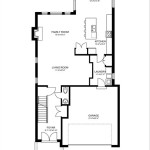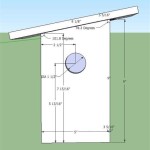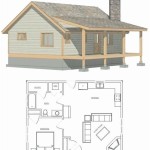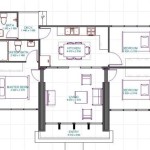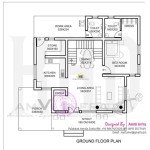Essential Aspects of House Plans and Floor Plans
Creating a house is a significant undertaking that requires careful planning and execution. House plans and floor plans serve as the blueprint for your dream home, defining its layout, functionality, and overall aesthetic. Understanding the essential aspects of these plans is crucial to ensure a successful building project.
House Plans
House plans provide a comprehensive overview of your home's design, outlining its exterior and interior features. They typically include:
- Exterior Elevations: Drawings depicting the house's exterior from different angles, including the front, back, and sides.
- Floor Plans: Scaled drawings showing the layout of each floor, including room sizes, door and window placement, and wall locations.
- Foundation Plan: Details the design and specifications of the house's foundation, ensuring structural integrity.
- Roofing Plan: Presents the type, pitch, and materials used for the roof, determining the home's overall aesthetic.
- Electrical Plan: Outlines the electrical wiring, outlets, and lighting fixtures throughout the house.
- Plumbing Plan: Specifies the location and layout of plumbing fixtures, including sinks, toilets, and showers.
Floor Plans
Floor plans are detailed drawings that focus exclusively on the layout of each level within the house. They provide a bird's-eye view, allowing you to visualize the flow and functionality of the living spaces.
Key elements to consider in floor plans include:
- Room Layout: Arrangement and size of rooms, considering their intended use and the desired flow of traffic.
- Wall Placement: Location and thickness of interior and exterior walls, including load-bearing walls.
- Door and Window Placement: Size, shape, and position of doors and windows, affecting natural lighting and ventilation.
- Appliance and Fixture Placement: Precise location of appliances, fixtures, and cabinetry, ensuring functionality and efficient use of space.
- Dimensions and Measurements: Accurate dimensions of rooms, walls, and openings, facilitating accurate construction and furnishing.
Importance of Professionalism
When creating house plans and floor plans, it is essential to engage the services of a qualified architect or designer. They possess the necessary knowledge, experience, and expertise to ensure the plans:
- Adhere to Building Codes: Meet local and state building regulations, ensuring safety and structural soundness.
- Maximize Functionality: Create a layout that optimizes the use of space, flow of traffic, and access to natural light.
- Reflect Personal Preferences: Design a home that aligns with the client's lifestyle, aesthetic sensibilities, and functional needs.
- Provide Accurate Documentation: Produce detailed and comprehensive plans that guide the construction process smoothly and accurately.
Conclusion
House plans and floor plans are indispensable tools for creating a home that meets your specific requirements and vision. By understanding their essential aspects and collaborating with a qualified professional, you can ensure that your dream home becomes a reality.

House Plans How To Design Your Home Plan

House Plans How To Design Your Home Plan

Top Tips For Choosing A Floor Plan Your New Home

How To Read A Floor Plan With Dimensions Houseplans Blog Com

Floor Plan Design House Plans Bungalow Architecture

Truoba Mini 221 House Designed As Guest Plans

Floor Plan Creator And Designer Free Easy App

Small House Design Shd 2024007 Pinoy Eplans One Y Bungalow Plans Layout

Floor Plans Types Symbols Examples

30 X70 House Plan


